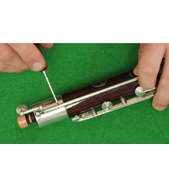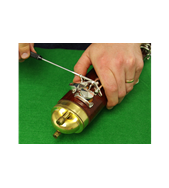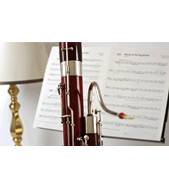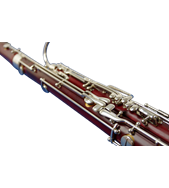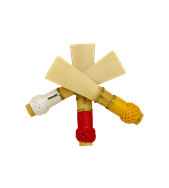A Month in the Life of a Bassoon Repair Workshop
July 19th, 2024

A Month in the Life of a Bassoon Repair Workshop
Ever wondered what goes on in a bassoon repair workshop? Here are the kinds of challenges we face in just one month.
The Bassoon Presents a Challenge
Bassoons are precision instruments. They have to be set up to sub-millimetre tolerances. Yet much of the work of a repairer is carried out by practised eye and hand, taking time and skill to carry out each step of bringing a bassoon back to life.
Bassoons are nearly all made of maple wood with nickel-silver keys. But that is where the standardisation ends.
Varnishes can be oil-based, French polish or polyurethane.
The keys can be plated or not and, if plated, covered in nickel or silver.
Then the keywork varies from bassoon to bassoon, and the condition of the wood, varnish, plating and keywork can each be anywhere on a scale from factory-fresh to filthy dirty, worn, damaged and bent.
So every bassoon presents a challenge, but the challenge is different for each one, needing extensive knowledge of wood care and treatment, varnish chemistry and application, dyeing techniques, metalwork and plating technology.
A Straightforward Service?
Much of the work of a bassoon repair workshop is in servicing, with each service taking anywhere from a day to a week to complete; this is how we approach a standard service:
- Remove the keys, and give the wood and metal a good clean – this prevents a build-up of dirt and grease from causing a myriad of problems, including binding keys and sticky pads and tone hole faces
- Oil the bore, change tenon corks and threads, repair any loose, binding or bent keywork, and re-grease the keys
- Obtain a good seal, so that the pads do not allow air to escape. Each pad has to be adjusted to sub-millimetre accuracy to achieve that seal, without which bassoons will not play as well as they should
- Adjust the key and pad heights, using corks and felts of the right thicknesses, again to sub-millimetre tolerances, so that they are comfortable under the hands and the open pads do not affect the intonation by being too close to the tone-hole
- Play-test the bassoon and carry out final adjustments
However, no service is actually straightforward, as many bassoons are hand-made or hand finished and so each one has quirks.
Not to mention the impact of years of use on the instrument (and sometimes the effects of accidental damage or mis-handling) and how that affects how we approach the job.
All of this is highly skilled work requiring years of training to reach the high standards we set ourselves. And it requires an intimate knowledge of bassoons and how they are played, so virtually all of our repairers are degree-qualified bassoonists.
What if a service isn’t enough?
If your bassoon gets run over by a bus, you may need to starting looking for a new one, but aside from a catastrophic accident like this, bassoons are almost infinitely repairable.
Lots of usage over a long period, though, might mean a service isn’t enough to bring your bassoon back to what it once was, and more extensive repairs may be needed. This is where the required skill, experience and equipment in a bassoon repair workshop needs to step up a level.
The kind of additional work we carry out depends on what the owner wants – some don’t mind battered varnish or worn plating, say, while others want their bassoon to look pristine.
Varnish
Worn varnish in small areas can often be re-coloured and varnished to match the surroundings so you would never know there was a worn patch to begin with. More extensive varnish damage would likely require completely stripping it down to the wood and starting again - applying stripes, layers of dye and then lots and lots of layers of varnish.
It is a time-consuming business but gives amazing results when done properly.
Re-plating
Re-plating keys is something we do all the time, either in nickel or silver (or, on occasion, gold!). The trick to obtaining a good result is meticulous preparation, which we always do in-house, and then take it to an external specialist plating company to actually do the plating.
Wood rot
It isn’t all about looks though, sometimes we find wood rot which needs fixing. The repair for this depends how bad it is. For mild cases, treatment of the wood is all that is needed, for extensive rot we have to drill out the rotten area and insert a sleeve to match the bore profile. This requires custom tooling and machinery, which we have invested in.
Thinking of keywork upgrades?
A service or repair brings a bassoon back to the way it played when it was first made - but what about making it even better?
This is where keywork upgrades come in – high D, high E, even high F keys; extra rollers; extended keys for easier reach; finger-hole liners; and many more options.
If it is a standard key from the maker we can buy it and fit it. If not, we will make it from scratch.
Adding extra keys is often a better way to get what you want than buying a whole new bassoon.
This process requires an additional level of skill, including:
- the ability to calculate angles and distances on a bassoon which isn’t flat, so the maths can be quite complex
- the ability to use metalworking tools and machinery, a step up in training from standard bassoon repair
Each month we have several keywork upgrade jobs going through our workshop.
A month in the life of a repair workshop can include all of the above jobs, together with assessing bassoons, estimating for work and meeting with customers, proving both technical and logistical challenge.
If your bassoon needs a service or repair work, please get in touch and we will be happy to help.
